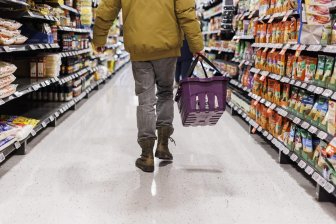The annual inflation rate skyrocketed to its highest level in nearly 40 years in May, fueled by soaring gas prices, Statistics Canada said Wednesday.

The agency said its consumer price index in May rose 7.7 per cent compared with a year ago, its largest increase since January 1983 when it gained 8.2 per cent, and up from a 6.8 per cent increase in April this year.
The gain came as energy prices rose 34.8 per cent compared with a year ago with gasoline prices up 48.0 per cent compared with a year ago.
Statistics Canada said crude oil prices rose in May due to the ongoing war in Ukraine, as well as increased demand as travel continued to grow in response to eased COVID-19 restrictions.
Excluding gasoline, the annual inflation rate in May rose to 6.3 per cent compared with 5.8 per cent in April.
Statistics Canada noted earlier this month that the transportation component, which includes gas spending, would take on a larger weighting in the consumer price index going forward, as would clothing and footwear. Essentials such as food and shelter took on slightly reduced weightings.
In the House of Commons on Wednesday, interim Conservative Leader Candice Bergen called on the Liberals to give Canadians relief at the pumps by following the lead of U.S. President Joe Biden, who called for a three-month gas tax break earlier in the day.
Minister of Natural Resources Jonathan Wilkinson in his response stood by the $8.9-billion in already announced spending Finance Minister Chrystia Freeland touted last week to help Canadians withstand inflation concerns.
He also pointed to efforts to increase oil production alongside the United States, Brazil and other countries during the war in Ukraine as showing the government is taking soaring gas prices seriously.
Soaring inflation makes 75 bps interest rate hike more likely: economists
The rising inflation rate comes as the Bank of Canada works to bring it back under control.
The central bank has raised its key interest rate target three times so far this year to bring it to 1.5 per cent and said that it is prepared to “act more forcefully” if needed, leading to speculation by economists that it could raise rates by three-quarters of a percentage point next month.

“We know inflation is keeping Canadians up at night. It’s keeping us up at night,” the Bank of Canada’s Senior Deputy Governor Carolyn Rogers said in Toronto in reaction to the figures.
“We will not rest easy until we get (inflation) back down to target… That’s why we’re raising interest rates, and we’re raising them quite aggressively,” she added.
TD Bank managing director Leslie Preston said a generation of Canadians is experiencing high inflation for the first time.
“If you aren’t over 40, you have never lived through inflation like this, and unfortunately, we are not expecting much of a reprieve going forward,” Preston wrote in a report.
“All of this reinforces the view that the Bank of Canada will hike by 75 basis points on July 13, following in the Fed’s footsteps.”
BMO chief economist Doug Porter said in a note that inflation could approach the eight per cent mark in June as gas prices have continued to rise.
- Posters promoting ‘Steal From Loblaws Day’ are circulating. How did we get here?
- Canadian food banks are on the brink: ‘This is not a sustainable situation’
- Is home ownership only for the rich now? 80% say yes in new poll
- Investing tax refunds is low priority for Canadians amid high cost of living: poll
He wrote that the Bank of Canada “still has a lot of work to do,” and said a 75-basis-point hike in July is “almost fully baked in.”
The average of the three core measures of inflation that are closely watched by the Bank of Canada rose to 4.73 per cent in May compared with 4.43 per cent in April.
Statistics Canada said the price for food bought at stores rose 9.7 per cent compared with a year ago, matching the April increase, as the cost of nearly everything in the grocery cart went higher.
The cost of edible fats and oils gained 30.0 per cent compared with a year ago, its largest increase on record, mainly driven by higher prices for cooking oils. Fresh vegetable prices rose 10.3 per cent.
The cost of services in May rose 5.2 per cent compared with a year ago, up from a gain of 4.6 per cent in April, as Canadians travelled and ate in restaurants more often.
Prices for traveller accommodation gained 40.2 per cent compared with a year ago, while the price of food purchased from restaurants gained 6.8 per cent.
— with files from Global News’s Craig Lord, Reuters




Comments